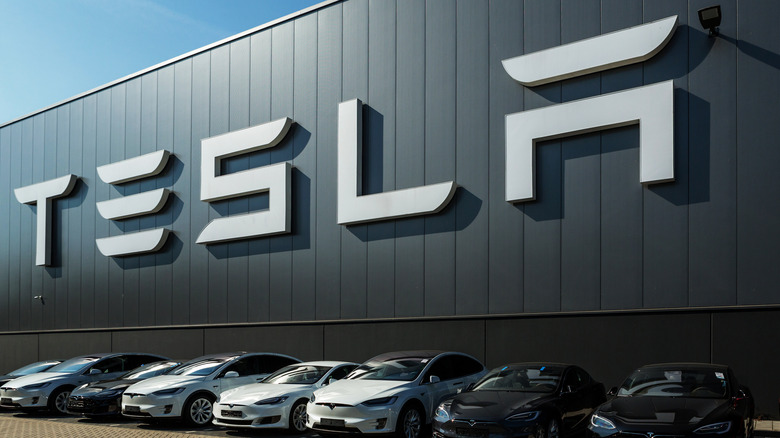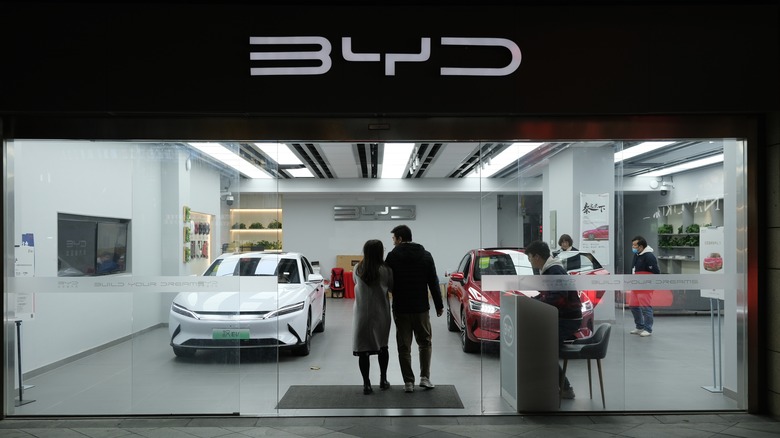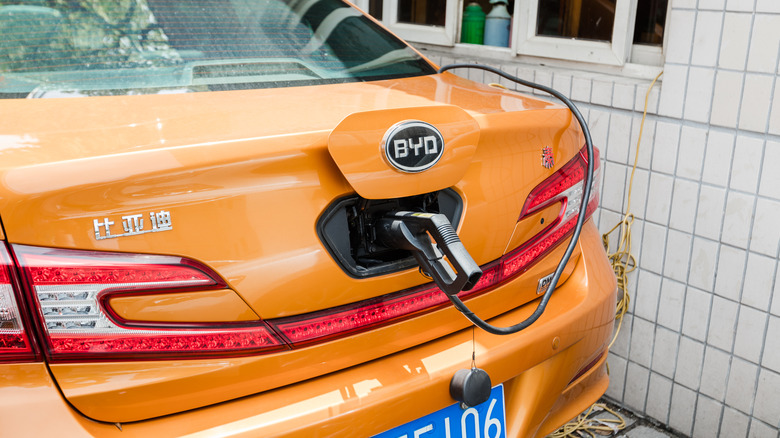The Truth About Claims Of Tesla Being Dethroned As The World's Top Seller Of EVs
Tesla is no longer selling more electric vehicles than any other company in the world. Elon Musk's company sold almost 100,000 fewer vehicles than its closest rival during the first half of 2022. Chinese EV manufacturer BYD now finds itself on top of the pile after selling 314% more vehicles than it did in the same period of 2021. Back in 2011, Musk dismissed any threat posed by BYD, claiming not to see it as a competitor and stating: "Have you seen their car? I don't think they have a great product. I don't think it's particularly attractive, the technology is not very strong, and BYD as a company has pretty severe problems on their home turf in China. I think their focus is and rightly should be, on making sure they don't die in China."
Part of the reason Tesla is no longer on top is linked to the issues caused by a lockdown at its Shanghai plant. Musk's company lost weeks of output from the plant — which is usually Tesla's most productive — following a COVID-19 outbreak. The shutdown saw the EV giant's share of global electric vehicle sales drop from 27% to 10% as a result. Fewer than 40,000 vehicles were registered by Tesla in April, which is a drop of 78% from the number it registered in March. BYD's factories are located in areas of China that managed to avoid recent COVID-19 outbreaks, and its production has not been affected. At first glance, it might seem like a bit of luck on the manufacturing side has what has put the Chinese EV maker on top, but if you dig a little deeper, it could be more complicated than that.
What is BYD?
Chinese company BYD is now the biggest selling electric vehicle manufacturer on the planet. According to a company filing [PDF], the Shenzhen-based manufacturer sold 641,350 fully electric vehicles and plug-in hybrids between the start of January and the end of June 2022. A late surge of sales in June totaling 134,000 was enough to push it well ahead of Musk and Tesla.
It has been a long road to the top for Tesla's closest competitor. BYD, which is an acronym for "build your dreams," was founded by Wang Chuanfu, a former chemistry major, in the mid-1990s. Like fellow electric vehicle maker Lucid, BYD originally started out as a battery manufacturer before deciding to build electric vehicles itself in the early 2000s (via The Financial Times). BYD currently sells its cars in at least 50 countries and claims its vehicles are present in over 300 cities. Unlike some electric vehicle makers — including Tesla, Lucid, and Polestar — BYD is not producing luxury electric cars. The company has instead focused on the lower end of the market and attempted to manufacture affordable vehicles, which may go some way to explaining the sales volume. BYD also produces non-consumer vehicles like taxis and buses.
The Chinese car manufacturer has also been backed by one of the most successful investors of all time. Warren Buffet's company Berkshire Hathaway first bought a slice of BYD back in 2008 and now owns around 8% of the electric vehicle maker.
Why Tesla could still be on top
Tesla enthusiasts could argue that BYD hasn't overtaken their favorite company and has instead chosen to compete under a broader category of "electric vehicle" — and they would have a valid point. Half of BYD's sales in the first half of 2022 have been plug-in hybrids, a type of vehicle that includes a gasoline engine. If the battery is charged regularly, plug-in hybrids can be run like a pure-electric vehicle. However, there is also the option of using them in the same way as a regular hybrid car — filling the tank and using the electric motors to drastically boost the number of miles you get to the gallon.
Plug-in hybrids are also becoming popular, with some users seeing them as an EV with a solid safety net or a kind of middle ground between fully electric and traditional hybrid. This sort of logic makes sense when you consider the consequences of running a fully electric vehicle until it runs out of juice and compare that with the ease of getting something with a gas tank going again. Sales of plug-in hybrids have increased to reflect this: they almost doubled in 2021.
In China, fully electric vehicles and plug-in hybrids both fall under the New Energy Vehicle category. Traditional hybrids like the Toyota Prius don't because they can't travel long distances while only using battery power. But there is some debate about whether plug-in hybrids and fully electric cars should be categorized separately. Tesla doesn't manufacture plug-in hybrids, so the current categorization puts it at a major disadvantage. If the stats are judged on full EV sales alone, Musk's company is still way out in front.


